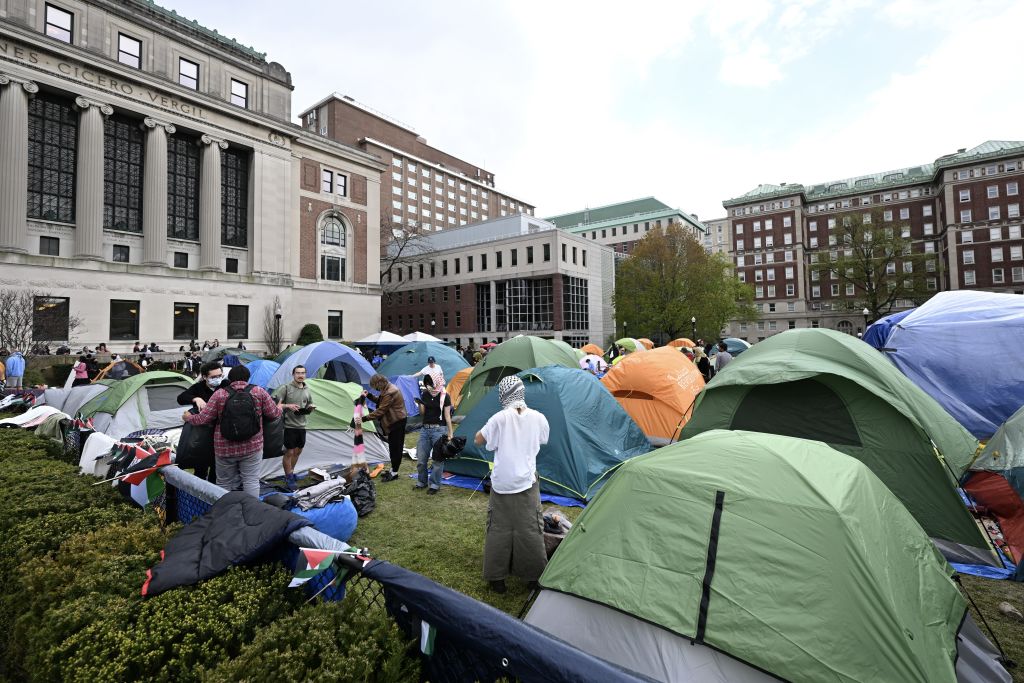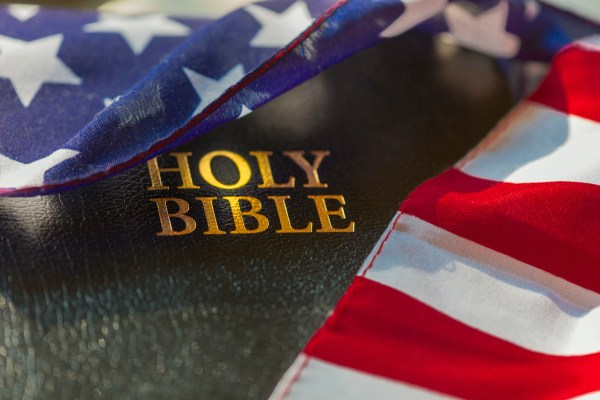More than 100 people staging a pro-Palestinian protest were arrested last week at Columbia University after the university president asked the NYPD to intervene. That didn’t quell the situation: A new tent camp was soon set up on the campus quad, and disorder has continued, with some protesters screaming, “We know where you live now” and throwing liquids at Jewish students. “Other pro-Palestinian protesters circling around the main gates claimed to be with Hamas,” reported a Jewish student. “One said ‘I am Hamas’ on video.” The university has moved to a hybrid class model to allow students to attend online for the rest of the semester, which ends next week. As of Wednesday, the university was working with student protesters to dismantle some of the tents in the encampment and ensure they would adhere to safety and behavioral guidelines.
The protests at Columbia are a product of the explosion of antisemitism on college campuses around the country since October 7 but have also inspired further demonstrations: Students have been arrested at New York University, Yale, and the University of Minnesota among others, and tent encampments are popping up on campuses across the country. Colleges and universities have a tool at hand to deal with this problem, if only they’ll use it: enforcing codes of conduct by clarifying expectations and holding perpetrators accountable.
Columbia President Minouche Shafik and other university officials testified before the House Education and Workforce Committee on April 17, claiming they were doing their best to maintain order. Yet the very next day, the situation became so chaotic that Shafik announced the suspension of the student protesters and asked the NYPD to clear the encampment.
Columbia has had a mixed record in addressing extreme anti-Israel incidents. On November 10, Columbia suspended its Students for Justice in Palestine (SJP) chapter after it engaged in an unauthorized walkout despite university warnings against such action. But then Columbia allowed a new group to take SJP’s place. That new organization hosted an event in March featuring speakers from what Israel calls a front group for the Popular Front for the Liberation of Palestine (PFLP), a U.S. government-designated terrorist group. Shafik denounced the event, hired an investigative firm to gather information, and suspended four students.
The congressional hearing clarified that radical teachers are part of the problem. Columbia administrators claimed to have removed professor Joseph Massad from a chair position over his praise of October 7 as “awesome” and other abhorrent remarks, but Columbia’s website still listed Massad as chair as of the April 15 hearing. And Shafik said she had fired Mohamed Abdou, who was hired after posting on social media: “I’m with Hamas & Hezbollah & Islamic Jihad.” Abdou remained on Columbia’s website as of April 17 and was reportedly present at the unsanctioned protest on campus during the hearing. Numerous Columbia faculty members aided protesters during demonstrations on Monday, holding signs that read “End Student Suspensions Now” and “Restore Faculty Governance.”
Elsewhere, protesters hijacked an annual awards ceremony at the University of Michigan on March 26. The protesters, in clear violation of university policy, shouted down and silenced their own university president, Santa Ono, cutting short an event intended to honor the academic achievements of undergraduates.
Has the university disciplined the disruptors? Unclear.
Thankfully, some outside of academia are trying to help. The House Education and Workforce Committee, which also called the presidents of Harvard, the University of Pennsylvania, and MIT to testify on their handling of campus antisemitism late last year, has initiated numerous inquiries. For its part, the Department of Education’s Office for Civil Rights has opened dozens of investigations of American colleges and universities for alleged violations of Title VI of the Civil Rights Act of 1964, which “prohibits discrimination based on race, color, or national origin for programs that receive federal funds.” A 2019 executive order clarified that antisemitic discrimination can fall under this rubric.
Yet too many administrators have failed to adequately clarify and enforce their own codes of conduct during the six months since the Israel-Hamas war began with Hamas’ invasion of Israel.
The University of California-Berkeley has been a hot spot since the days following Hamas’ brutal attack. On October 16 protesters blocked the central section of Berkeley’s landmark Sather Gate. Finally, more than five months later, the university chancellor announced she would post observers after protesters had blocked the entrance with yellow tape for weeks. When the university finally removed the tape, protesters replaced it with a massive banner, mocking university authorities and continuing to block the gate.
Unsurprisingly, the protesters didn’t stop there. On February 26, Jewish students were forced to evacuate an event when violent demonstrators broke through doors to prevent an Israeli lawyer from speaking. A mob gathered outside smashed windows and assaulted Jewish students. A Jewish student declared three days later at a congressional hearing, “It’s not safe to be a Jewish student at UC-Berkeley.”
Just two weeks ago, Berkeley law students turned Dean Erwin Chemerinsky’s dinner for students at his home into a protest. Prior to the event, radical students published a poster featuring a caricature of Chemerinsky holding a bloody fork and knife, which, said Chemerinsky, “invokes the antisemitic trope of blood libel.” Later, a law student hijacked the dinner to make a speech condemning Israel.
On the East Coast, American University has been targeted. On October 19, multiple Jewish students discovered swastikas graffitied on their dorm room doors. In November, a pro-Israel, Jewish student’s piano recital poster was defaced with a swastika and the words “DEATH TO THE ZIONISTS HITLER WAS RIGHT.” And a protest organized by SJP inside a class building on November 9 clearly violated the school’s code of conduct by intentionally interfering with students’ right to study.
On January 25, about a week after a nonprofit filed a federal complaint against the university for a campus climate hostile to Jewish students, American’s president released a new policy effective for the spring semester that included a ban on indoor protests. Daring the university to enforce its new guidelines, SJP conducted an indoor protest on February 8. The university responded on April 8, putting SJP on probation.
Some administrators are imposing more serious consequences. On April 5, Vanderbilt University announced the expulsion of three students, the suspension of another, and disciplinary probations for 22 other students who had protested Vanderbilt’s refusal to divest from Israel by conducting an overnight sit-in that began with a broken window and an assault on a security officer.
Also on April 5, at Pomona College in California, police arrested 20 anti-Israel protesters who stormed the college president’s office and refused to identify themselves.
A university’s code of conduct serves a foundational role in cultivating an ethical campus community and healthy learning environment. Such codes function as a collegiate “rule of law,” governing a democratic microcosm and transitional training ground for adult citizenship in a diverse democracy.
Unfortunately, too many students are either unaware of their university’s code of conduct, or they don’t mind violating it. Administrators can nip this problem in the bud by including questions about freedom of speech, peaceful protest, and respect for the dignity of others in the application process. And when students accept an offer of admission, leaders should then systematically teach students what the university expects of them during the orientation process, requiring admitted students to certify that they have read the code of conduct and commit to abide by it. School pronouncements about fighting antisemitism and publications of disruptive activity policies are helpful. But clear expectations must be supported by visible, swift, and consistent corrective actions.
And for students who don’t take these expectations seriously, there is no substitute for consequences.








Please note that we at The Dispatch hold ourselves, our work, and our commenters to a higher standard than other places on the internet. We welcome comments that foster genuine debate or discussion—including comments critical of us or our work—but responses that include ad hominem attacks on fellow Dispatch members or are intended to stoke fear and anger may be moderated.